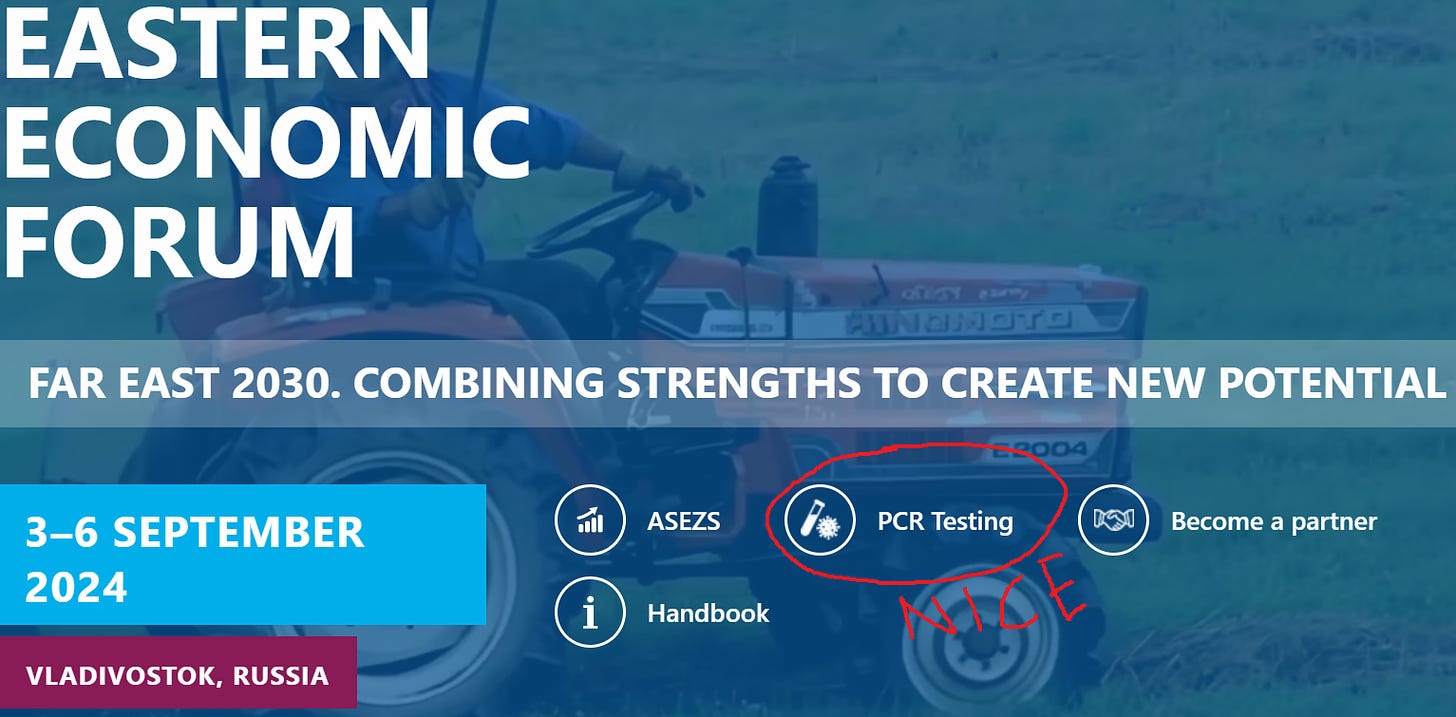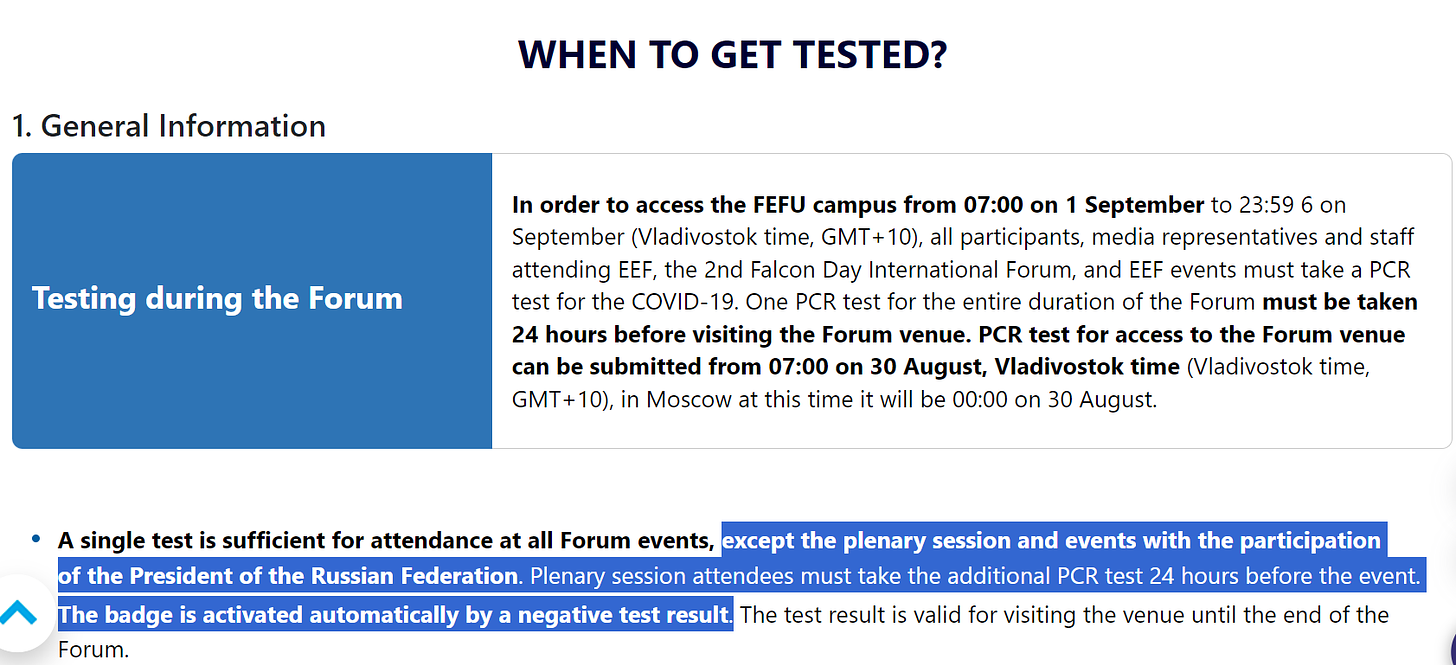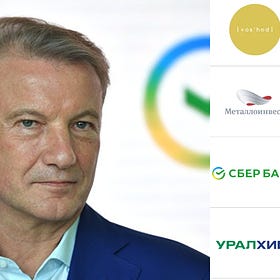If you like carbon neutrality and Disease X, you'll love Russia's EEF-2024
But first you'll need to take a PCR test (obviously)

What would you pay for the privilege of sitting in a room full of incorrigible lunatics as they spewed awe-inspiring gibberish in defense of the global oligarchy and its ongoing plans to make life thoroughly intolerable?
If your answer to this tempting question is “$6,768 and that’s my final offer—not a penny more, not a penny less,” then you need to hustle to Vladivostok because the Eastern Economic Forum ENDS TOMORROW. You’ve already missed “Disease X: How Can We Prepare for the Unknown?” and many other delightfully soul-crushing panel discussions.
This is a forum that you simply can’t afford to miss unless you also plan to be at the G20, Davos, or Bohemian Grove—because the exact same topics will be discussed at these conferences as well.
As per tradition, you will need to take a PCR test to participate in this year’s Eastern Economic festivities.
Actually, you will need to take two not-fit-for-purpose scam-tests if you want to listen to Vladimir Putin talk about Eastern Economic things. Better safe than sorry.
(The extra PCR test for Putin might make some readers a tad bit uneasy—but have no fear! Some time ago your correspondent wrote a four-part blog-report, “Putin & COVID”, detailing the Russian president’s top secret shadow war against the WHO and Big Pharma. Please read this important series (Part I, II, III, IV) to better understand that this additional Eastern Economic PCR test is part of Putin’s cunning plan to send Bill Gates to a penal colony in Siberia before he is recruited by Russia’s MOD to sit in a trench in East Ukraine until he is killed by a suicide drone.)
Trust the plan.
Anyway.
Assuming you are PCR-Negative, you will have access to a Business Program jam-packed with Multipolar Eastern Wisdom:
Russia and China: Working Together towards Carbon Neutrality by 2060
Russia and China are among the world’s top five largest greenhouse gas emitters, and the success of their efforts to achieve carbon neutrality by 2060 will largely determine the extent to which the goals of the UN Framework Convention on Climate Change and the Paris Agreement will be achieved. China has a national greenhouse gas emissions trading system, while Russia has introduced mandatory carbon reporting and is conducting an emissions trading experiment on Sakhalin island. The two countries are trying to find the most effective regulatory solutions that will help to achieve comprehensive decarbonization taking into account their own specific national circumstances, while also continuing to implement economic growth and development plans. Given the growing rate of carbon regulation, Russian and Chinese companies have a great opportunity to build cooperation in supplying resources and exchanging technology, which are crucial to implementing the ambitious climate goals. What challenges and opportunities does cooperation in low-carbon development create for companies? Could carbon regulation be used to increase competitiveness and penetrate new markets? How can we ensure the mutual recognition and comparability of measures and efforts to reduce greenhouse gas emissions?
BONUS: The moderator of this titillating panel discussion is the CEO of Russia’s National ESG-Alliance—a shameless grift spearheaded by Russia’s friendliest bank, Sber.
I know what some of you are thinking: Carbon neutrality is great, but is the Multipolar World Order ready to support the WHO when it declares another fake pandemic, murdering hundreds of millions of people in the process? EEF-2024 will alleviate your very valid concerns.
Disease X. How Can We Prepare for the Unknown?
We can only talk hypothetically about how dangerous, contagious, or lethal Disease X might be in the future. However, it is highly likely that a new pathogen with pandemic potential will emerge in Southeast Asia. Given the population density, urbanization, degree of economic integration, rapidly growing interrelations, and pace of trade and economic development, the countries in the region need to create new opportunities for cooperation in epidemic risk management, the early detection and suppression of new infections, as well as research and development in terms of diagnostics and vaccines. How Southeast Asia ends up preparing for Disease X will dictate whether a new pandemic will be more destructive than COVID-19. Is the threat of a new unknown Disease X real? When can we expect it and what will contribute to its emergence? What do we need to do to prevent the emergence of a new pandemic? Is Southeast Asia ready for the next pandemic? Will it be able to protect the world and prevent the spread of a potential disease? What priorities exist for scientific and technical cooperation among countries in the region to improve their readiness for infectious threats? What cooperation mechanisms need to be strengthened and developed to improve preparedness and respond to pandemics?
BONUS: The panel’s moderator, Vyacheslav Smolensky, is a high-ranking Russian WHO bootlicker who studied in London. Coincidence or fate?

Moving on.
Adaptation to Climate Change: Challenges and Opportunities for Business
Long-term observations indicate that the average annual temperature on the Earth’s surface in Russia has been growing by an average of 0.51 °C every 10 years since the mid-1970s (the temperature growth rate has increased by 0.04 °C compared with 2019), which is 2.8 times higher than the average growth rate in global temperatures (0.18 °C every 10 years). The growth rate in Russia’s Arctic zone is 3.9 times higher than the average global rate (0.71 °C every 10 years). The adaptation process involves adjusting to actual or expected climate change and its consequences in manmade and natural systems in order to reduce harm or take advantage of favourable opportunities. Is Russian business ready to integrate adaptation principles into their economic activities, and how would this affect such business processes as risk management and long-term planning? Is it better to deal with such issues today or is this an additional burden on business?
BONUS: Moderated by Sberbank’s Senior Vice President for ESG.
Because the East does things differently than the West.
More on that:
A New Climate Order
The UN Summit of the Future needs to outline the main focuses for the organization’s development for the period after 2030. At the Summit, world leaders will approve the Pact for the Future, which demonstrates global solidarity in the interests of present and future generations. One of the main components of this document will be the climate agenda. The next Conference of the Parties (COP) to the UN Framework Convention on Climate Change will take place in Baku in November 2024. One of the main objectives will be to set a collective quantifiable target for financing. The presidencies troika, which includes the United Arab Emirates, Azerbaijan, and Brazil, is preparing a roadmap that aims to significantly expand international cooperation and stimulate countries to be more ambitious in their contributions at the national level to step up their actions to contain global warming. What climate agenda issues will be considered at the UN Summit of the Future? What will be the key themes at the upcoming climate conference in Baku? What kind of objectives will be set in the run-up to the anniversary COP, which will take place in Brazil in 2025?
To summarize, this is the Multipolar World that we are all looking forward to.
Southeast Asia in a Multipolar World
In today’s world, where globalization and integration are becoming increasingly significant factors in the development of society, special attention is paid to regions that play a key role in the formation of the new world order. The Asia-Pacific has become a new centre of politics and economics, playing a key role in the modern geopolitical system. And no one can deny that the centre of global development has shifted to this region. Southeast Asia is a critical region for global politics, where complex political processes are unfolding, including territorial disputes and changing balances of power between various countries. How does the changing balance of power in the Asia-Pacific affect the global geopolitical situation? What external forces influence political processes in the Asia-Pacfic? How might the process of decoupling that is taking place between the United States and China change global political and economic relations? What are NATO’s interests in the Asia-Pacific in the context of the U.S.–China rivalry? Could Southeast Asia become the new global financial centre?
Moderator: Alexander Dugin. Not a joke.
Honestly this is getting tiresome.
THE EDWARD INSTITUTE FOR VILLAGE STUDIES WASN’T EVEN INVITED TO THIS HISTORIC ANTI-GLOBALIST CONFERENCE. WHY WHY WHY TELL SUSAN WHY.







Tovarich, i submitted a potato (raw), piece of bread (stale) and jar of vodka (strong) to the authorities for PCR testing and they all came back PSYOP-19 positive.
Everything is as it should be comrade.
Wow, Putin is such a tough guy that he needs 2! PCR tests to protect him from the sniffles.
Russia's supposed to be this technologically advanced nation and somehow they're still scared of a bullshit hyped up flu?
Morons or sell outs.
I'm sure the Duran and other fanbois will see this as wisdom to protect the great leader himself from flu like symptoms 😂.